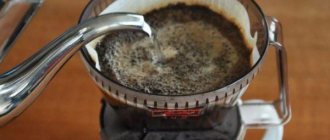Most people who have kidney problems or periodically experience pain in this area do not even think that coffee may be the cause. They usually talk about the dangers of caffeine for the cardiovascular system; people with high blood pressure avoid it, but they often do not mention the effect on the kidneys. It would seem that just a cup in the morning, another 2-3 throughout the day, is not much, but the consequences can be quite serious. Why do your kidneys hurt after coffee, and how not to give up the drink, but also not harm yourself?
How does coffee affect the kidneys?
Approximately 9-12% of caffeine is excreted by the kidneys in unprocessed form. It affects the entire urinary system, as it is a diuretic, that is, it stimulates the excretion of fluid.
- When drinking about 3 cups of coffee, the volume of fluid excreted increases almost 3 times.
- The balance of electrolytes and mineral metabolism processes are disrupted.
- Caffeine constricts blood vessels, contracts all muscles, and therefore the smallest grains of sand can touch the urinary canals, causing pain.
- Caffeine leaches calcium, sodium and potassium. The body does not receive enough water, but the process of diuresis continues. Minerals accumulate in the kidney ducts, stagnate, and the process of stone formation begins.
Caffeine dulls the feeling of thirst, and therefore we cannot feel that the body needs clean water. If you have kidney problems, it is important to always drink a glass of water with every cup of coffee.
Harm to the product
Before talking about interesting research by scientists about its effect on the course of kidney diseases, it is necessary to share information about the effect of the product on the functioning of organs.
- Drinking coffee is not recommended if your kidneys hurt. After all, it is these organs that remove up to 10% of caffeine unchanged. Because of this, in most people the daily volume of urine increases several times, which leads to disturbances in the metabolic processes of electrolytes and minerals in the body. For example, the product removes calcium and sodium in large quantities.
- It is known that coffee is a natural diuretic. However, the diuretic effect of the drink can cause dehydration, which primarily affects the kidneys. The fact is that with dehydration, the cleansing function of the organs deteriorates. At the same time, the concentration of uric acid, creatinine and urea in the urine increases. But that’s not all: due to dehydration, the load on the kidneys increases significantly, and the risk of thrombosis and blockage of the renal veins increases.
- There is evidence that drinking coffee beans causes a short-term increase in blood pressure. This especially applies to people who do not drink the drink all the time. Doctors have long known that kidney disease is closely related to the development of hypertension. The fact is that high blood pressure is fraught with kidney damage due to chronic narrowing of the lumen in the blood vessels and structural changes in organs (in particular, renal arterioles). Therefore, people with acute kidney disease should avoid drinking caffeine-containing drinks. In the chronic form of the disease, it is allowed to drink coffee in a minimal amount.
- Consumption of freshly brewed grains in large doses (6-7 cups per day) increases the risk of malignant tumors in the kidney structures. However, in fairness, it must be said that scientists have proven that with moderate consumption of the product, the risk of developing kidney, liver and prostate cancer is reduced several times.
The effect of coffee on stone formation
So, we have already found out that it is not recommended to drink coffee if you have diseased kidneys. But how does the product affect healthy organs? Should you be afraid of drinking coffee?
A number of sources claim that caffeine-containing products lead to the formation of kidney stones. But recent research by American scientists proves the opposite. It turned out that the risk of urolithiasis increases when drinking sweet soda. But coffee, tea, wine and even beer in moderate doses can reduce the risk of developing the disease.
But in case of renal failure, regular consumption of coffee can cause a deterioration in the patient’s well-being. It turns out that caffeine increases the symptoms of kidney disease and metabolic syndrome.
For example, experiments on diabetic rats have shown that when the substance is regularly ingested, the level of protein in the urine increases and the heart rate increases. It was also noted that the arteries of rodents become less flexible, which can lead to increased blood pressure.
Coffee for acute and chronic cystitis
Despite the fact that the product has a mild diuretic effect, it is not recommended to take it during the acute stage of the disease. The fact is that caffeine and tannins contained in coffee, black and green tea irritate the bladder, which can increase pain and worsen the patient’s well-being. In addition to taking medications, doctors advise drinking a lot of water.
For some people, drinking coffee during illness does not bring additional discomfort. Therefore, lovers of aromatic, invigorating beans can try drinking 1 cup of coffee a day, washed down with plenty of water. If you do not notice any deterioration in your health, you can continue.
Why do my kidneys hurt after drinking coffee?
If lower back pain appears or worsens after drinking a cup of your favorite drink, it means that the process of formation of sand and stones, urolithiasis, has begun.
The sand usually comes out on its own, but as it moves through the channels, pain, stinging, and burning may be felt. Sometimes it hurts in the lower abdomen, in the bladder area. Stones can be small or large, most often there are 1 or 2 of them, with smooth edges, but there can be more of them, and the edges can be sharp, scratching the kidneys and urinary ducts. The more sharp edges there are, the more severe the renal colic is felt.
Other symptoms that show that the kidneys are not coping and do not have time to process caffeine may include:
- Fever;
- Small amount of urine with frequent urination;
- Dark color of urine, pungent odor;
- Aching pain or general discomfort in the lower back.
If you do not pay attention to the slight pain when removing the sand, it will eventually turn into stones. Blood and sediment may appear in the urine. If the pain is sharp and the usual remedies do not help, you should immediately call an ambulance, since treating the kidneys is difficult, and usually requires hospitalization or at least a qualified examination to identify the cause of the pain.
Solution: How about tea?
Not all teas make you feel worse when it comes to your kidneys. There are many varieties that are not associated with disease and can help you feel better! The key that is already known is caffeine and oxalate levels, as well as other constituents such as certain antioxidants that may be beneficial for kidney health.
- Green tea. Good news for green tea lovers! Green tea has been found to help prevent the progression of kidney disease due to polyphenols. Green tea also contains lower levels of oxalates than other drinks and higher levels of EGCG, which means green tea may help prevent kidney stones. In addition, green tea does not contain creatinine, a waste product of the body that is filtered from the blood by healthy kidneys. Unhealthy kidneys may not filter this chemical effectively, causing creatinine levels in the blood to rise. But with green tea, you don't have to worry about that.
- Rooibos tea. Rooibos is a godsend: it has little tannins, no caffeine and no oxalates! In one study of red and green rooibos, no negative effects were noted. The animals were given rooibos as the only liquid to drink, after which no negative effects on kidneys or creatinine were observed. There were also no side effects or reports of clinical pathology outside the acceptable range in the human trial.
- Chamomile tea. Like rooibos, chamomile tea does not contain caffeine. It contains few tannins and oxalates. However, chamomile may have more benefits than just being neutral on the kidneys. In a study, animals with nephrotoxicity (kidney toxicity that impairs body function) were given chamomile and it was found to improve their overall condition. Chamomile also reduces kidney dysfunction due to high-fat diets. In short, there is some pretty good evidence that chamomile is good for your kidneys!
What kind of coffee makes your kidneys hurt: natural or instant?
The kidneys can hurt in any case, since the main substance affecting the body is still caffeine. But there is usually much more of it in instant coffee, since instant coffee is made from the cheaper Robusta variety, which contains more caffeine. In addition, during processing, dyes, emulsifiers, preservatives, impurities and many other chemical components are added to powder or granules, which also negatively affect the kidneys, as they are excreted through them. Therefore, drinking instant coffee may cause a faster onset of urolithiasis.
Instant coffee is contraindicated for people with kidney problems.
Natural coffee is Arabica or Robusta beans, or a mixture of them. Taking care of your kidneys, you can choose 100% Arabica, preferably high-altitude Arabica. It contains less caffeine, only 1.2-1.5% compared to 2.5-2.7% in Robusta, but there are many natural acids, fats and antioxidants that protect the body from the inside. You should also not get carried away with a natural drink, but it is definitely safer than an instant one.
How does decaffeinated coffee affect your kidneys?
This drink still contains minimal doses of caffeine (it is impossible to completely remove it), but it is definitely safer for the kidneys than other options. We are talking about natural coffee. In soluble, of course, caffeine is extracted, but other chemical components are present, and there are 75-85% of them.
Experts do not recommend drinking decaffeinated drinks in large quantities if you have kidney disease. 2-3 cups a day will not cause harm, but you need to focus on your feelings and well-being.
The harm of constant coffee consumption
“Would you like some coffee?” - this is like a motto when you go to an office reception or invite friends to your home. Coffee is an ideal drink that can stimulate conversation with its invigorating effect. But be careful, it can disrupt the healthy functioning of your body.
A harmless amount is up to 400 milligrams per day - that's about 4 cups. It stimulates thinking and protects the liver from cardiovascular diseases. Several serious studies have shown such results. But those who consume more than this amount harm themselves. Therefore, you should always pay attention to this.
Anyone who has drank too much coffee experiences the following symptoms:
- Pain in the stomach because the bitter substances that the drink contains attack the stomach lining.
- Shortness of breath due to too high blood pressure.
- Involuntary eye twitching due to nerve irritation.
- Increased heart rate as caffeine stimulates the heart.
- Anxiety and excitement.
- Nervousness due to irritation.
- Migraine due to effects on blood vessels.
- Headache from too much caffeine.
Anyone who notices one or more of these symptoms should stop drinking coffee immediately. The amount of coffee per day should also be reduced gradually. If the described symptoms go away, then the cause of their occurrence has been correctly established.
If symptoms do not go away, you should consult a doctor as there may be other problems.
Rules for drinking coffee if you have kidney disease or risk thereof
There is no need to give up your favorite drink. Just a few simple tips from leading nephrologists will help you stay healthy.
- Drink coffee made from natural beans, preferably Arabica, not Robusta.
- Do not drink coffee on an empty stomach; the best time is half an hour or an hour after a meal.
- Be sure to drink a glass of clean still water after coffee.
- Do not drink in one gulp - it is better to drink a smaller volume, but in small sips, so that the kidneys have time to process the caffeine.
- Choose coffee that is not too hot or iced.
- It is recommended to add milk or lemon to neutralize the caffeine.
If you notice that your kidneys hurt after a cup of coffee, but then the pain subsides, increase the amount of water you drink per day. Add some physical activity, going for walks is good, but it is important not to get too cold. And be sure to consult your doctor. Many problems can be solved at the initial stage without much pain or intervention, with medication.
So is it possible to drink coffee if you have kidney stones or not?
As studies have shown, the problem is not in coffee itself as a drink, but in dehydration of the body. Caffeine only has a diuretic effect, increasing dehydration, but in itself it is useful, as it allows you to quickly remove fluid from the body without overloading the kidneys. The volume of urine increases after drinking coffee because the drink interferes with the body's ability to reabsorb water. Water is removed through the urine, which reduces uric acid levels and is ideal for preventing uric acid kidney stones. In addition, minerals that crystallize into stones in concentrated urine completely dissolve in an alkaline environment.
It's all about overall fluid intake. People who drink about 2 liters of water daily do not have problems with dehydration, and, consequently, with the formation of kidney stones, and caffeine even helps them prevent KSD, even with high hereditary risks.
If you have a predisposition to urolithiasis, be sure to drink enough water throughout the day, and wash down each cup of coffee with a glass or even two of clean, still water.
Coffee with milk for urolithiasis
Coffee with milk is considered a gentler drink, and although there is caffeine, milk in some way weakens and neutralizes its effect, without leading to the formation or enlargement of stones. Even patients with urolithiasis are allowed to drink a light milk-coffee drink if the dose does not exceed a cup per day. With a mild form of the disease, you can allow yourself a couple of cups of your favorite drink with milk per day, provided that you generally follow a diet and monitor your condition.
Conclusion
- Caffeine can have a negative effect on the kidneys: it removes calcium and is a diuretic. Mineral deposits are deposited as sand and sometimes form rocks.
- The first sign of kidney problems is if the lower back begins to hurt after drinking coffee, and pain and burning appears when urinating.
- Instant coffee is more harmful to the kidneys than natural coffee: it contains more caffeine and various chemical additives.
- Decaffeinated coffee does little harm to the kidneys, especially if it is natural. You can drink 3-4 cups a day.
- In any case, if your kidneys hurt after drinking coffee, you need to consult a doctor!
Is it possible to drink coffee if you have urolithiasis?
Doctors around the world have conducted studies in which they either observed healthy people who drank 3-4 cups of coffee a day, or people with a predisposition to KSD, in which case doctors monitored how their usual diet affected the development of the disease.
- Studies have shown that in healthy people who drank 3-4 cups of their favorite drink a day after a short break, within a week the amount of calcium in their urine increased sharply, which means that coffee still flushes it out.
- People who regularly consumed caffeine during ICD experienced attacks somewhat more often than those who did not drink coffee at all or drank 1-2 cups per week.
Researchers from the Harvard School of Public Health's Department of Nutrition designed a study to evaluate the effect of certain drinks on the formation of kidney stones. In this study, which appeared in the October 1996 issue of the American Journal of Epidemiology, researchers determined the association between 21 different types of drinks and the risk of kidney stones in more than 45,000 men. They found that caffeinated or decaffeinated coffee reduced the risk of kidney stones by 10 percent. That is, it’s not just about caffeine, but in general about the substances contained in coffee.
How to reduce your risk of developing kidney disease
If you cannot refuse the pleasure of pampering yourself with your favorite drink, then remember a few rules that will help you avoid unpleasant consequences:
- Do not drink it on an empty stomach. When consuming the product on an empty stomach, the risk of kidney stones increases several times. Scientists analyzed the effects of caffeine on the body after a 14-hour fast. It turned out that during this experiment there was an increased excretion of calcium in the urine. Nutrition experts believe that it is best to drink coffee 40-50 minutes after eating.
- Use only high-quality product. It is known that the caffeine content in Arabica is 1.2%, and Robusta - 2.5%.
- Never consume instant coffee if you have kidney stones or other problems related to the functioning of these organs. It has been proven that the caffeine content in it is higher than in the classic bean version.
- After drinking the aromatic drink, do not forget to drink enough water. For each cup - at least two glasses of purified liquid. Thanks to a number of studies, it became known that every 500 ml. water reduces the risk of stone formation by 7%.
It is forbidden to drink coffee during an exacerbation of kidney disease: stones, pyelonephritis, and cystitis. You should not use it if you have a genetic disease - autosomal recessive polycystic disease. In this case, caffeine may promote the growth of the kidney cyst.
Permissible doses of consumption
Although the benefits of the coffee drink have long been known, this does not mean that it can be consumed in unlimited quantities. And in the presence of certain diseases, it can even be harmful to human health.
Scientists have calculated that a safe dose is considered to be 200-300 mg. caffeine per day. In turn, this portion is equal to 2 cups of an invigorating drink and 3-4 glasses of tea. People with kidney disease should reduce their consumption to a cup of coffee and two glasses of tea a day.
It is also recommended to reduce the consumption of other caffeine-containing products - chocolate, cocoa. The list of restrictions also includes a number of medications - antiemetics and painkillers.
Can I drink coffee with milk?
Many people like this particular option for drinking a caffeinated drink. It must be said that it is acceptable to drink coffee with milk, but you need to choose only a product with a low fat content (up to 2%). However, its positive effect on human kidneys is too exaggerated.
In many sources you can find information that this dairy product reduces the risk of kidney stones. Recent studies have shown that milk has no effect on their appearance.
The only thing to consider is that the milk drink should not be consumed before a kidney ultrasound. Experts advise limiting yourself to water. It is recommended to stop drinking alcohol and milk a few days before the planned examination (caffeine-containing products are allowed). You can also drink water, fruit juice and natural juices.
Now you know how coffee affects diseased kidneys, and in what cases it is undesirable to drink the drink, when you should not drink coffee, how to reduce the risk of developing diseases of this paired organ and avoid relapses.
As you understand, coffee is not enemy number one for the kidneys. Its use is contraindicated only in acute forms of disease. In other cases, a cup of freshly brewed aromatic coffee will not harm the body. We can safely say that if you have diseased kidneys, drinking sugary carbonated drinks and sports supplements containing caffeine is much more dangerous.









